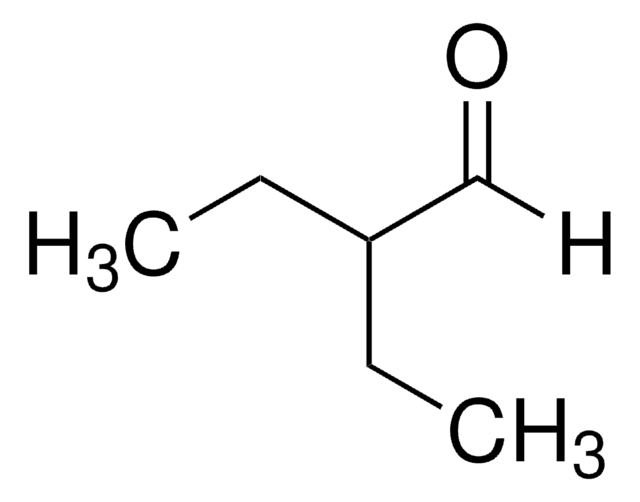W269107
2-Methylbutyraldehyde
≥95%, FG
Synonyme(s) :
2-Methylbutanal
About This Item
Produits recommandés
Source biologique
synthetic
Niveau de qualité
Qualité
FG
Fragrance grade
Halal
Kosher
Agence
(EU Regulation 1223/2009)
(follows IFRA guidelines)
Conformité réglementaire
EU Regulation 1334/2008 & 178/2002
FDA 21 CFR 117
FDA 21 CFR 172.515
Pureté
≥95%
Impuretés
<5% isopentanal
Indice de réfraction
n20/D 1.3919 (lit.)
Point d'ébullition
90-92 °C (lit.)
Densité
0.806 g/mL at 20 °C
0.804 g/mL at 25 °C (lit.)
Application(s)
flavors and fragrances
Documentation
see Safety & Documentation for available documents
Allergène alimentaire
no known allergens
Allergène de parfum
no known allergens
Propriétés organoleptiques
chocolate; coffee
Chaîne SMILES
[H]C(=O)C(C)CC
InChI
1S/C5H10O/c1-3-5(2)4-6/h4-5H,3H2,1-2H3
Clé InChI
BYGQBDHUGHBGMD-UHFFFAOYSA-N
Vous recherchez des produits similaires ? Visite Guide de comparaison des produits
Description générale
Application
- In Staphylococcus aureus, the acyl-CoA synthetase MbcS supports branched-chain fatty acid synthesis from carboxylic acid and aldehyde precursors.: This study explores the role of the enzyme MbcS in Staphylococcus aureus, demonstrating how it utilizes 2-Methylbutyraldehyde as a precursor in the synthesis of branched-chain fatty acids, which are essential for bacterial growth and virulence (Dos Santos Ferreira et al., 2024).
- Volatile Short-Chain Aliphatic Aldehydes Act as Taste Modulators through the Orally Expressed Calcium-Sensing Receptor CaSR.: This study investigates how volatile short-chain aldehydes, including 2-Methylbutyraldehyde, modulate taste perception through the calcium-sensing receptor CaSR, providing insights into their potential applications in food and flavor industries (Kitajima et al., 2023).
Mention d'avertissement
Danger
Mentions de danger
Conseils de prudence
Classification des risques
Aquatic Chronic 2 - Eye Irrit. 2 - Flam. Liq. 2 - Skin Sens. 1 - STOT SE 3
Organes cibles
Respiratory system
Code de la classe de stockage
3 - Flammable liquids
Classe de danger pour l'eau (WGK)
WGK 2
Point d'éclair (°F)
23.0 °F
Point d'éclair (°C)
-5 °C
Équipement de protection individuelle
Eyeshields, Faceshields, Gloves, type ABEK (EN14387) respirator filter
Certificats d'analyse (COA)
Recherchez un Certificats d'analyse (COA) en saisissant le numéro de lot du produit. Les numéros de lot figurent sur l'étiquette du produit après les mots "Lot" ou "Batch".
Déjà en possession de ce produit ?
Retrouvez la documentation relative aux produits que vous avez récemment achetés dans la Bibliothèque de documents.
Les clients ont également consulté
Notre équipe de scientifiques dispose d'une expérience dans tous les secteurs de la recherche, notamment en sciences de la vie, science des matériaux, synthèse chimique, chromatographie, analyse et dans de nombreux autres domaines..
Contacter notre Service technique













